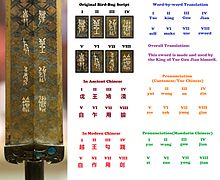Hui Shi
Appearance
(Redirected from Hui Shih)

Hui Shi (Chinese: 惠施; pinyin: Huì Shī; Wade–Giles: Hui Shih; 380–305 BCE), or Huizi (Chinese: 惠子; pinyin: Huìzǐ; Wade–Giles: Hui Tzu; "Master Hui"), was a Chinese philosopher during the Warring States period. He was a representative of the School of Names dialecticians inspired by Mozi, and is famous for ten paradoxes about the relativity of all things.
Quotes
[edit]


- Hui Shih was a man of many devices and his writings would fill five carriages. But his doctrines were jumbled and perverse and his words wide of the mark. His way of dealing with things may be seen from these sayings:
- "The largest thing has nothing beyond it; it is called the One of largeness. The smallest thing has nothing within it; it is called the One of smallness."
- "That which has no thickness cannot be piled up; yet it is a thousand li in dimension."
- "Heaven is as low as earth; mountains and marshes are on the same level."
- "The sun at noon is the sun setting. The thing born is the thing dying."
- "Great similarities are different from little similarities; these are called the little similarities and differences. The ten thousand things are all similar and are all different; these are called the great similarities and differences."
- "The southern region has no limit and yet has a limit."
- "I set off for Yueh today and came there yesterday."
- "Linked rings can be separated."
- "I know the center of the world: it is north of Yen and south of Yueh."
- "Let love embrace the ten thousand things; Heaven and earth are a single body."
- With sayings such as these, Hui Shih tried to introduce a more magnanimous view of the world and to enlighten the rhetoricians.
- Zhuangzi, Ch. 33, as translated by Burton Watson (1968), p. 374; this contains the core of what has survived of Hui Shi's philosophy, most of the records of it having been eradicated in the vast "burning of books and burying of scholars" during the Legalism of the Qin dynasty.
- A madman is running towards the east, the man who chases after him also running towards the east. They are similar in running towards the east, but different in why they run towards the east.
- As quoted in Chinese Culture (Chinese Cultural Research Institute, 1996), p. 35
Quotes about Hui Shi
[edit]- My phrase is a moment, the moment of fixity in the monologue of Zeno the Eleatic and Huí Shih (“I leave today for Yüeh and I arrive yesterday”). In this monologue one of the terms finally devours the other: either motionlessness is merely a state of movement (as in my phrase), or else movement is only an illusion of motionlessness (as among the Hindus).
- Octavio Paz, in El mono gramático [The Monkey Grammarian] (1974), English translation (1981), Ch. 4
- Chuang Tzu and Hui Tzu were strolling along the dam of the Hao River when Chuang Tzu said, "See how the minnows come out and dart around where they please! That's what fish really enjoy!"
Hui Tzu said, "You're not a fish — how do you know what fish enjoy?"
Chuang Tzu said, "You're not I, so how do you know I don't know what fish enjoy?"
Hui Tzu said, "I'm not you, so I certainly don't know what you know. On the other hand, you're certainly not a fish — so that still proves you don't know what fish enjoy!"
Chuang Tzu said, "Let's go back to your original question, please. You asked me how I know what fish enjoy — so you already knew I knew it when you asked the question. I know it by standing here beside the Hao."- Zhuangzi, Ch. 17, as translated by Burton Watson (1968), p. 188
- Chuang Tzu was accompanying a funeral when he passed by the grave of Hui Tzu. Turning to his attendants, he said, "There was once a plasterer who, if he got a speck of mud on the tip of his nose no thicker than a fly's wing, would get his friend Carpenter Shih to slice it off for him. Carpenter Shih, whirling his hatchet with a noise like the wind, would accept the assignment and proceed to slice, removing every bit of mud without injury to the nose, while the plasterer just stood there completely unperturbed. Lord Yuan of Sung, hearing of this feat, summoned Carpenter Shih and said, 'Could you try performing it for me?' But Carpenter Shih replied, 'It's true that I was once able to slice like that but the material I worked on has been dead these many years.' Since you died, Master Hui, I have had no material to work on. There's no one I can talk to any more."
- Zhuangzi, Ch. 24, as translated by Burton Watson (1968), p. 269

